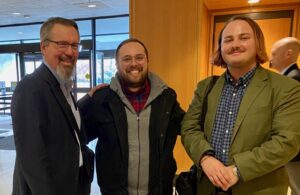Tax Fairness Oregon volunteers have been working every day since the legislative session began, reading bills, testifying before committees and lobbying members. Communicating with our membership has taken a backseat. Here is a diary entry—February 9—from one of our active members, Bennett Minton.
Democracy is work
This is Dylan and Nick, students at Oregon State and Oregon. We had just testified in the Capitol on a bill that, as we recommended be amended, is the next step in securing more efficient funding for the state version of Pell Grants. I estimate our chance of passage of our proposal—one TFO began developing a year ago—at 80%. (It is really hard to pass a bill.)
I had testified before three other committees earlier in the day, each of them considering bills that would make things better or worse for the state’s residents. It was the most satisfying workday I’ve had in my formerly paid profession in 29 years, since I was an aide in Congress.
My first hearing of the day was supposed to consider an amendment that the committee chair had directed be drafted per our suggestions in a hearing two weeks ago. The bill would hand out $1,000 to every qualifying volunteer firefighter (Oregon has about 8,000), ostensibly to aid recruitment and retention. The problem is that a few counties—the legislature hasn’t asked for a list, so we don’t know which counties—lack the money to pay for training and equipment, so their volunteers are expected to pay thousands of dollars out of their own pockets for serving their fellow citizens.
The counties lack the money because of decisions the legislature and the voters have made over the past 30 years to slash taxes that fund local governments. Property taxes are essentially frozen (plus a 3% annual increase) because of a voter initiative in the 1990s. The legislature has eliminated most taxes timber companies used to pay, reasoning that growing trees is just like growing strawberries; we don’t tax strawberries, so we shouldn’t tax timber harvests. (Which allows forest owners, most of which are corporations, to treat their property as an asset of no value other than fruit.) And Oregon has no sales tax, a prime local revenue source in many states.
I wouldn’t expect most legislators to take on Oregon’s disastrous tax code. But just one might search for a solution to the firefighter shortage rather than issue press releases. Instead, legislators propose handouts for shortages of all kinds of workers, especially in the rural areas where voters routinely reject local tax initiatives. Every session, my colleagues and fellow TFO, volunteers read every bill looking for tax giveaways, and testify against handouts that don’t work.
When I arrived, the chair said he would not take up my amendment to jigger with the handout because the sponsor refused it. But he allowed me to testify. I told the committee, whose jurisdiction includes emergency response, that it lacked the information needed to devise an effective solution to the problem the bill pretends to address: Which counties don’t pay for firefighter training? The committee will refer the unchanged bill to another committee, and I’ll repeat the argument.
Next I testified on a bill that would raise the exemption for the state estate tax. It was the second time in two weeks I had testified on a bill to give heirs tax-free inheritances:
“Some 15 estate tax bills have been introduced this year. Their sponsors attend to those who won the birth lottery and stand to inherit more than $1 million [the current estate tax exemption]. If we housed our citizens, paid our teachers appropriately, supported our police forces adequately, had a mental health service system not ranked 50th among the states, subsidized colleges the way we did 40 years ago so that graduates didn’t carry crushing debt burdens, and provided a functioning criminal justice system with constitutionally required public defense attorneys, we might relate to their concern. But compared to any other crying need in our society, these bills don’t rank.”
Next, a bill to provide grants to rural newspapers in information deserts. For an hour witnesses told the committee that without informed citizens, democracy dies. A high school student said he loved journalism because growing up in rural Oregon, he hadn’t been allowed to watch the news or read the newspaper. I was there to testify against another part of the bill that would give tax credits to publishers of non-profit community newspapers—because the provision wouldn’t work. But the sponsor announced that provision would be struck, so I limited my remarks to my story: I have always been a reporter; my first job after college was working at a community paper in rural Virginia; a decade later I began the transition to tax policy analysis—a job I’m still doing, as a volunteer, three decades later. Here I was speaking about a bill to support that kind of newspaper because of my expertise in tax.
In between, I continued meeting with legislators to build support for a bill saving the state $25 million a year by disconnecting from the most outrageous federal tax giveaway ever, “Opportunity Zones.”
The college grants bill would extend a law under which sophisticated taxpayers can buy, at a discount, the tax credits that fund the grants. The auction proceeds go to the grants fund; the discount goes into the pockets of the tax-credit buyers. In this way, the buyers have siphoned $3.7 million from students over four years. Our proposal, which we’ve been explaining to the chairs of the six committees involved, would kill the auctions and fund the grants in the traditional way, through appropriations, which already provide 85% of the money. The chairs appear to be on board. (“This is dumb,” said the chair at the top of the hierarchy.)
If students can get a few more grants every year (actually several hundred) for the same money because I spent weeks getting legislators to join hands, that alone will have been worth my last five winters working the building.


